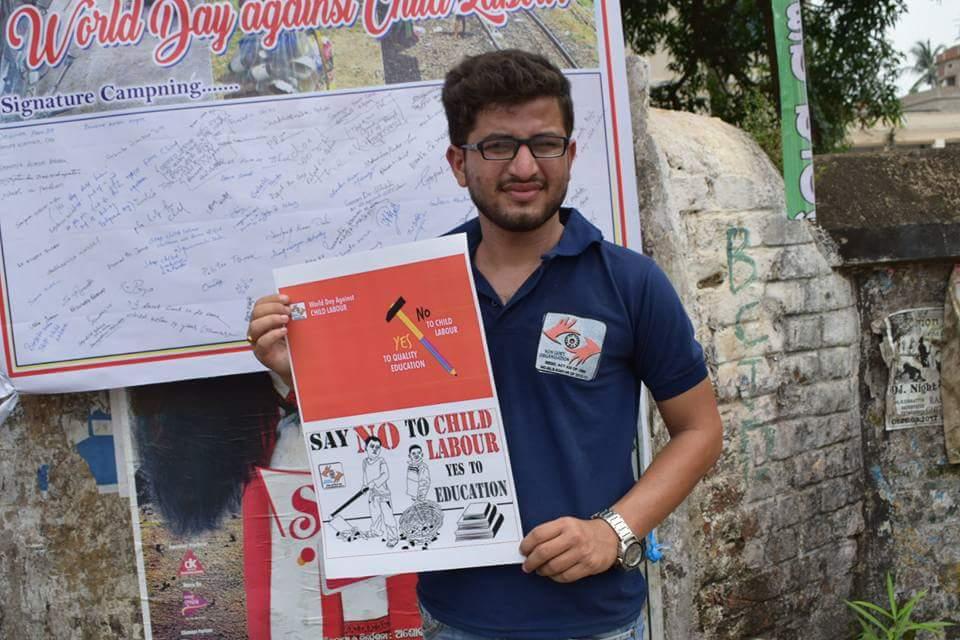A large number of children living in the slums of Odisha are deprived of basic education. Many of these children are forced into child labour and the narcotics trade. The bestway to keep slum kids away from unscrupulous elements is to educate them. This is what Swastik Kumar Dey, who has taken up social service after completing engineering, does to give a better life to slum kids.
“You can’t do anything in life without education. This is the the foundation of my own success, and the fuel that drives my goal of educating slum children. WhenI was a child, my parents instilled in me a desire to learn and taught me to value education. Now I want to pass on these values to underprivileged children. Their parents see no purpose in educating children when they can earn for the family,” maintains Swastik.
Hailing from Balasore, Swastik took to social service after completing his engineering degree. He says, “I went to Rasalpur village and Arada Bazar in Balasore district after cyclone Phailin struck the state in 2013. I joined some RSS volunteers to distribute relief materials among the needy. I was taken aback to see the plight of slum children in particular. They were crying for a handful of rice whereas their parents were enjoying their desi fermented drink or ricebeer called handia. When I inquired about their education, I came to know that most of the children were dropouts and rag pickers. It really hurt me to see their plight and I decided to teach them to bring positive changes.”
He continues, “When I started providing free tuition classes to kids at Arada Bazaar where tribal people and Bangladeshi refugees live, I noticed that most of the children were reluctant to attend classes in the evening. I learnt from local sources that Arada Bazaar under Sahadebkhunta police limits is a haven for drug traders. Wholesale trading of brown sugar takes place there. And, most importantly, slum kids play a prominent role in the narcotics trade. To divert their attention, we started playing with the kids in the evening hours before imparting lessonsto them.”
In 2013, Swastik formed a voluntary organisation called Ray of Hope to reach more slum kids and provide them basic education. Swastik is helped bythe 100 odd members of the organisation,many of them students. Regarding finances, he says, “I spend my pocket money. I have made it a point not to spend money for things like a costly cell phone or bike. I try my best to save every buck and use that for the upliftment of slum kids. Quite a fewof our members are working people. While students contribute from their pocket money, working people spend up to 30 per cent of their salary for our cause. There aretimes when I have goneto sleep on an empty stomach to meet my students’ expenses. We are determined to bring qualitative changes in the children’s lives. We don’t have a school building. We teach in the open. You couldsay it’s an open-air school.”
Currently pursuing a Master’s in Social Service at the National Institute of Social Work and Social Sciences, Swastik regrets that, at a time when India is proud to have great women achievers like Kalpana Chawla, there are still places where people don’t let their daughters go to school. “I still remember the incident when Parvati (name changed) of Arada Bazaar told me‘Bhai mu bahahebini’ (I don’t want to marry). She wantedme to convince her family not to solemnise her marriage. She was a brilliant student and cleared the Class X board examinations with flying colours and wanted to get admission in a Plus II science college. I tried my best to convince her family to allow her to study further, but my efforts werein vain. She is now a mother of two. This is the predicament of most girls residing inthe locality. They are not allowed to dream. They are told from their formative years that they are meant to do household chores and look after a family.”
Swastik adds, “Often, my friends tease me saying, ‘See, there goes the UP school teacher.’ I don’ttake their remarks seriously as my only concern is to provide quality education to slum children. I usually follow the work ofnon-profit organisations like Goonj, Made and Gram Vikash to make our classes more resourceful. I am highly inspired by the initiatives taken by Goonj founder Anshu Gupta, who consistently works for the betterment of slum people.”
Apart from imparting lessonsto children of slum dwellers at Balasore, Ray of Hope’score members also teach students at Jagannath Leprosy, RK Leprosy and Radhakrushna slums in Bhubaneswar.
Swastikcreditshis success to parents Santosh Kumar and Subarna Dey, adding that he owes his success also to the core members of his organisation, Ghanashyama Thapa, Sasmita Majhi and NishitaMohapatra. He is also thankful to the District Child Welfare Committee member Harish Ray for guiding him throughout his journey. Apart from bagging the Biapada ra Bandhu award, Swastik has been felicitated by Kanya Kiran and Sochorganisations.
“I am happy that our effort is being noticed and valued. So far, kids fromslums where we are taking classes have learnt how to maintain decorum inclassrooms. Earlier, they used to come to classrooms in a disorderly fashion. Besides, they did not know how to write their names when we started taking classes. I am glad to see them moving aheadin life.”
RASHMI REKHA DAS,OP
